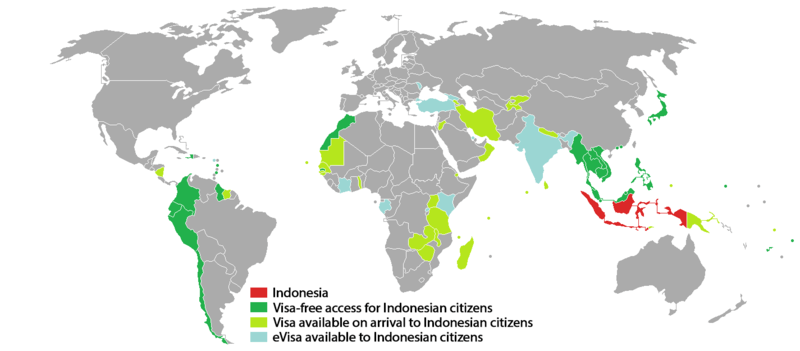Indonesian nationality law
The Indonesian nationality law is a law regulating about who an Indonesian citizen is, the requirements and how to obtain Indonesian citizenship, the loss of Indonesian citizenship, the requirements and how to re-obtain Indonesian citizenship, and the penal provision. The nationality law is stated in Constitution of Indonesia.
The Indonesian nationality law is based on jus sanguinis and jus soli. The latest law regulating Indonesian nationality is Law No. 12/2006 (UU No. 12 Tahun 2006). This law revokes Law No. 62/1958 (UU No. 62 Tahun 1958).
Generally, Indonesian citizens are those natural Indonesian people and those of other nationalities that are endorsed by the law as Indonesian citizens. Indonesian nationality regulated by Law No. 12/2006 (UU No. 12 Tahun 2006). The Indonesian nationality law is based on jus sanguinis and jus soli. The Indonesian nationality law does not recognize dual citizenship except for persons under the age of 18 (single citizenship principle). After reaching 18 years of age individuals must choose one citizenship (limited double citizenship principle).[1]
Indonesian citizen
An Indonesian citizen is:
- one who before the enactment of this law was already an Indonesian citizen
- a child from a legal marriage whose parents are Indonesian citizens
- a child from a legal marriage whose father is an Indonesian citizen and mother is a foreign citizen
- a child from a legal marriage whose mother is an Indonesian citizen and father is a foreign citizen
- a child from a legal marriage whose mother is an Indonesian citizen and father is stateless or whose nationality law does not give citizenship to offspring
- a child from a legal marriage born within 300 days after the father's death and the father was an Indonesian citizen at the time of death
- a child from an illegal marriage whose mother is an Indonesian citizen
- a child from an illegal marriage whose mother is a foreign citizen but the father is an Indonesian citizen and recognizes the child as his child before the child turns 18 or is married
- a child born in Indonesian territory whose parent's citizenship status is unknown
- a newly born child found in Indonesian territory as long as the father and mother are unknown
- a child born in Indonesian territory if the parents are stateless or cannot be found
- a child born outside of Indonesian territory whose parents are Indonesian citizens and, because of the law where the child was born, the child was granted another citizenship
- a child from whose father or mother was already granted Indonesian citizenship but died before taking an oath of allegiance
Obtaining Indonesian citizenship
A foreign citizen can apply to become an Indonesian citizen with the following requirements:
- being the age of 18 years or older, or being married
- when applying, having resided in Indonesian for a minimum of 5 consecutive years or 10 non consecutive years
- physically and mentally healthy
- can speak the Indonesian language and acknowledge Pancasila and Undang-Undang Dasar Negara Republik Indonesia Tahun 1945
- never convicted of a crime for which the punishment is imprisonment for one year or more
- if having Indonesian citizenship will not give the person dual citizenship
- employed or have fixed income
- pay the citizenship fee
Any application for citizenship is granted by the President of Indonesia.
Losing Indonesian citizenship
This could happen if:
- a person over the age of 18 obtains another citizenship by his/her own will
- a person does not reject or release another citizenship even he/she has the opportunity to do so
- A person renounces Indonesian citizenship to the President of Indonesia on his/her own will with the provision that he/she is already 18 years old or married, is staying in a foreign country, and is not stateless if he/she loses Indonesian citizenship
- a person joins a foreign military without the President's permission
- a person voluntarily taking another country's oath of allegiance
- a person has a valid passport or other passport-like documents from a foreign country as proof of citizenship
- staying outside Indonesian territory for 5 consecutive years, not stating the will to stay as Indonesian citizen before the 5-year period is over, and not reporting every 5 years to a representative of the Indonesian government
Travel freedom

In 2016, Indonesian citizens had visa-free or visa on arrival access to 58 countries and territories, ranking the Indonesian passport 79th in the world according to the Visa Restrictions Index.
See also
- Indonesian identity card
- Indonesian passport
- Visa policy of Indonesia
- Visa requirements for Indonesian citizens
References
- ↑ "Indonesia's New Immigration Law Confuses One and All". Jakarta Globe. Retrieved 2012-06-15.
External links
- Official site
- (Indonesian) Law No.12/2006 (UU No.12 Tahun 2006)
- (English) Law No.12/2006